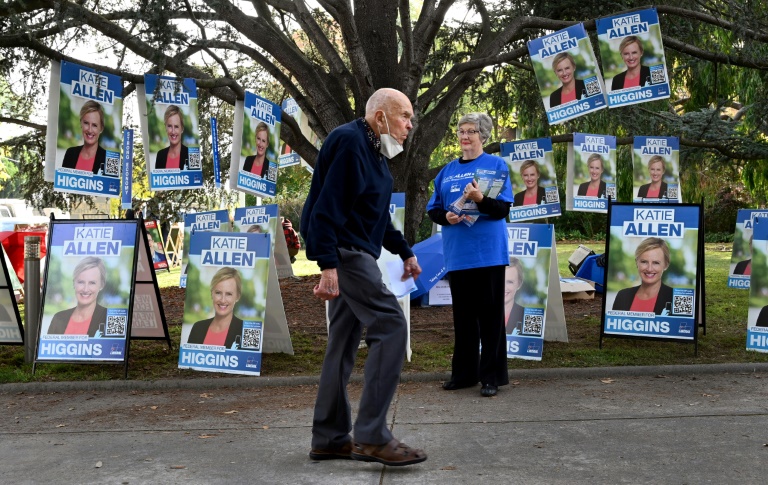The man narrowly tipped to become Australia’s next prime minister predicted a “close” outcome in Saturday’s vote, as he barnstormed the country in an eleventh-hour bid to defend a shrinking lead.
“We knew that this election was going to be close,” said Anthony Albanese, admitting his Labor Party still had a “mountain to climb” to end nine years of conservative government.
More than 17 million Australians are registered to vote in an election that could bring an end to decades of stalling on climate change and a less pugilistic style of leadership.
“I have given absolutely everything.
I have got nothing left in the tank,” Albanese said, embarking on a last-minute four-state blitz.
Prime Minister Scott Morrison, who defied the polls three years ago in what he termed a “miracle” election, is pounding out the same message that worked last time: Labor cannot be trusted on the economy.
He has characterised Albanese as a “loose unit” because of his high profile gaffes, notably forgetting the national jobless rate when quizzed by reporters.
– ‘Not up to the job’ –
“This is the sort of stuff that prime ministers need to know,” Morrison said in an interview Friday.
“We have seen that he is not up to the job and it’s bigger than him.”
The prime minister boasted of new data showing Australia’s unemployment rate fell to a 48-year low of 3.9 percent in April as an “extraordinary achievement” that showed his plan was working.
Both sides are trying to woo voters fretting about the rising cost of living, with annual inflation shooting up to 5.1 percent and wages failing to keep up in real terms.
In a country scarred by ever-fiercer floods, fires and droughts, Labor is promising to do more to help the environment.
Morrison has resisted calls to cut carbon emissions faster by 2030 and supports mining and burning coal into the distant future to support the economy.
In wealthy suburban areas, many voters are being wooed by a band of more than 20 independent candidates, mostly women, offering conservative policies coupled with strong action on climate change.
Albanese has also promised strong action on corruption — after Morrison failed to deliver a promised federal anti-corruption watchdog.
He has branded Morrison’s administration the “least open, least fair dinkum government in Australian political history.”
– Covid-19 voting fix –
In the final days before the vote, Morrison’s economic warnings appear to have whittled down the polling lead enjoyed by Labor.
But all surveys still show Morrison’s coalition lagging behind.
An Ipsos poll released late Thursday gave Labor a 53-47 percent lead over the coalition on a two-party preferred basis.
An Essential survey released the previous day indicated a narrower Labor lead of 48-46 percent.
Registered voters are required by law to cast a ballot to avoid a Aus$20 (US$14) fine.
But in the first Australian federal vote since Covid-19 spread across the world, election officials rushed through a last-minute change in the rules to allow more infected people to cast a vote by telephone.
Besides the economy, the six-week election campaign has focused heavily on trust.
Morrison’s honesty has been questioned by his own ministers and even French President Emmanuel Macron, who felt deceived by Australia’s decision to abandon a lucrative French submarine contract.
– ‘Bulldozer’ –
Morrison has admitted he can be a “bulldozer”, saying: “I know there are things that are going to have to change with the way I do things.”
Albanese, in turn, has been criticised for a stumbling performance when questioned on the details of policy by reporters.
The election campaign has also delivered lighter moments.
Three days before the vote, Morrison barrelled into a young boy, sending both crashing to the ground during a friendly children’s football game in Tasmania.
The following day, Australia’s employment minister, Stuart Robert, appeared to deflect blame for the incident from the prime minister: “There was a high five afterwards, so it was just an error from both of them,” he said.











